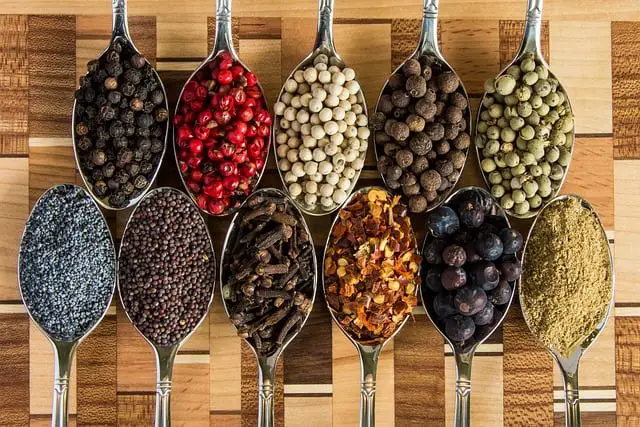Sometimes when cooking, you might go overboard and add too much of a particular spice. Suddenly you taste more of that spice than you’d otherwise like. What can you do?
There are a few things you can try to lessen the taste of a spice that is a bit too overpowering than what you’d like:
Add more ingredients
When you have added too much spice to a dish, one option is to add more of the other ingredients in the recipe to balance out the flavor. For example, if you’ve added too much cayenne pepper to a soup, you could try adding more broth or cream to balance out the heat.
Another option is to add a milder-tasting ingredient, such as a potato, to absorb some of the spice.
Dilute the dish
You can also try diluting the dish by adding more liquid, such as water or stock. If the dish is still too spicy, you can try serving it with a side of plain yogurt or sour cream, which can help cool down the heat.
If diluting with liquid doesn’t work, you could also divide the dish into two and then go back to step one and add some extra ingredients (without extra spices) to help dilute the taste of the spices.
Increase the cooking time
You can also allow the dish to cook a bit longer to draw out other flavors in some cases. Cooking for a longer period of time can affect the flavor of spices in different ways, however.
On the one hand, ground spices can lose their potency over time and may need to be added towards the end of cooking to maintain the intended level of flavor. Additionally, certain spices like garlic and onion can become sweeter and milder as they cook.
So with these spices, you might find that cooking the dish longer can help to lessen their taste and overall effect.
In some cases however, cooking for a longer period of time can cause the flavors of the spices to become more concentrated and intense as the liquid in the dish evaporates. In other cases, cooking for a longer period of time can cause the flavors of the spices to become more muted or diluted. It depends on the type of spice, the dish and the cooking method.
For example, when cooking a dish with whole spices (such as cinnamon sticks or whole cloves), the flavors tend to be more pronounced the longer the spices are cooked.
The best way to know how long you should cook a dish with spices is to taste as you go and adjust the seasoning as needed.
Spices to avoid overusing
Some spices should be used in moderation as they can quickly overpower a dish if too much is used. Here are a few examples of spices you should take care to avoid overusing in a dish:
- Black pepper: too much black pepper can give a dish a harsh, biting flavor.
- Cayenne pepper: a little bit of cayenne pepper can add a nice amount of heat to a dish, but too much can make it overwhelmingly spicy.
- Nutmeg: too much nutmeg can give a dish a bitter, almost soapy flavor.
- Cloves: cloves have a very strong, pungent flavor that can be overwhelming if too much is used.
- Turmeric: it gives a nice yellow color and a mild earthy taste, but in large quantity, it can make the dish taste too bitter.
- Mustard powder: it has a strong, pungent flavor and can be overpowering if too much is used.
It’s always a good idea to start with a small amount of spice, and then taste and adjust as needed. This will help you avoid using too much and ruining the dish. Additionally, different dishes have different spice requirements and it’s always good to check the recipe before adding spices.

